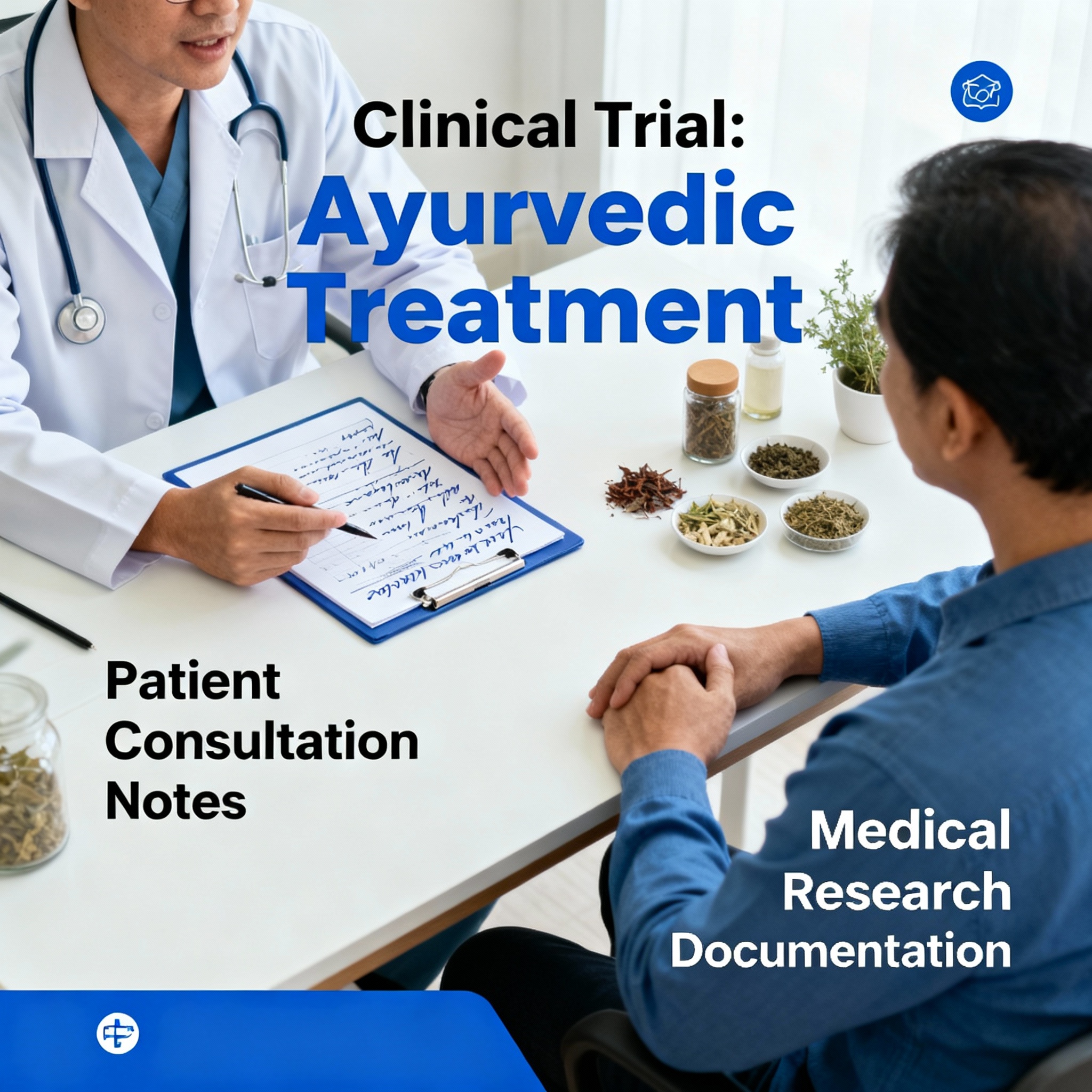The Landscape of PhD Research in Ayurveda
PhD research in Ayurveda has evolved dramatically over the past two decades, moving beyond simple clinical trials to embrace cutting-edge technologies including genomics, proteomics, metabolomics, artificial intelligence, and systems biology. Modern doctoral research seeks to establish scientific validity for classical Ayurvedic concepts while developing innovative treatment protocols that integrate traditional wisdom with contemporary medical science. The Central Council for Research in Ayurvedic Sciences (CCRAS) and leading institutions like the National Institute of Ayurveda (NIA), All India Institute of Ayurveda (AIIA), and Institute for Post Graduate Teaching and Research in Ayurveda (IPGT&RA) are actively promoting fundamental, translational, and applied research across all Ayurvedic specialties.
Priority Areas for Doctoral Research in Ayurveda
Contemporary PhD research in Ayurveda focuses on several thrust areas including standardization of knowledge interfaces through development of validated assessment tools, scientific evaluation of fundamental Ayurvedic principles using interdisciplinary approaches, generation of evidence base through translational research, development of healthcare technologies and databases using artificial intelligence and machine learning, pharmacovigilance studies, Ayurgenomics, and personalized medicine based on Prakriti assessment.
Department-Wise PhD Thesis Topics in Ayurveda
1. Kayachikitsa (Internal Medicine) – PhD Research Topics
Kayachikitsa offers the broadest spectrum of doctoral research opportunities, spanning metabolic disorders, autoimmune diseases, degenerative conditions, and integrative medicine approaches.
PhD Research Topics:
-
Ayurgenomics and Prakriti: Genome-wide association studies correlating Prakriti with genetic polymorphisms and disease susceptibility patterns, epigenetic modifications influenced by Rasayana therapy in aging populations.
-
Systems Biology of Diabetes Management: Network pharmacology analysis of multi-herb Ayurvedic formulations in Type 2 Diabetes Mellitus, metabolomic profiling of Prameha Chikitsa interventions.
-
Immunomodulation Through Rasayana: Molecular mechanisms of immune enhancement by classical Rasayana formulations, proteomic analysis of Chyawanprash effects on innate and adaptive immunity.
-
Cardiovascular Translational Research: Clinical and molecular evaluation of Hridya drugs in heart failure management, comparative effectiveness research of Ayurvedic versus conventional cardioprotective therapies.
-
Neurodegenerative Disease Management: Neuroprotective mechanisms of Medhya Rasayana in Alzheimer’s disease models, clinical trials on Parkinson’s disease management through Vata-balancing protocols.
-
Integrative Oncology: Adjuvant Ayurvedic therapies in cancer management, quality of life improvements through Rasayana interventions during chemotherapy, prevention of recurrence through immune-enhancing protocols.
-
Autoimmune Disease Research: Molecular pathways of Ama formation in rheumatoid arthritis, efficacy of Panchakarma-based protocols in systemic lupus erythematosus management.
-
Chronic Kidney Disease: Renoprotective mechanisms of Ayurvedic formulations, delayed progression to dialysis through integrated Ayurvedic interventions.
-
Metabolic Syndrome Management: Multi-component Ayurvedic intervention studies addressing obesity, dyslipidemia, hypertension, and insulin resistance simultaneously.
-
Psychoneuroimmunology: Mind-body interventions in inflammatory diseases, role of Sattvavajaya Chikitsa in psychosomatic disorders with biomarker validation.
-
Post-COVID Management: Long COVID syndrome management through Rasayana therapy, restoration of Ojas through targeted interventions with immunological assessment.
-
Personalized Medicine Protocols: Development of Prakriti-based treatment algorithms for common metabolic disorders, validation through randomized controlled trials.
2. Dravyaguna Vigyan (Pharmacology) – PhD Research Areas
Dravyaguna offers immense scope for pharmacological validation, phytochemical characterization, and drug discovery research combining traditional knowledge with modern scientific methodologies.
PhD Research Topics:
-
Ethnopharmacological Documentation: Systematic documentation and validation of folklore medicinal practices in specific geographical regions, authentication of controversial and substitute drugs.
-
Pharmacogenomics: Gene-drug interactions in Ayurvedic herbal formulations, personalized dosing based on genetic polymorphisms affecting drug metabolism.
-
Reverse Pharmacology: Identification of novel bioactive compounds from Ayurvedic herbs through traditional knowledge-driven drug discovery approaches.
-
Nanoayurveda: Development and characterization of nanoparticle-based drug delivery systems for classical Ayurvedic formulations enhancing bioavailability and efficacy.
-
Toxicological Profiling: Comprehensive safety evaluation of herbomineral preparations according to OECD guidelines, establishment of therapeutic index for classical formulations.
-
Multi-target Network Pharmacology: Computational analysis of poly-herbal formulations identifying multiple molecular targets, systems pharmacology approaches to understanding Ayurvedic drug actions.
-
Adaptogen Research: Molecular mechanisms of stress adaptation by Ashwagandha, Tulsi, and Guduchi through HPA axis modulation, cortisol regulation studies.
-
Anti-inflammatory Drug Development: Identification and isolation of novel anti-inflammatory compounds from classical Ayurvedic herbs, mechanism-based drug development.
-
Cardioprotective Phytochemicals: Bioassay-guided fractionation of Arjuna bark identifying specific cardioprotective compounds, clinical validation studies.
-
Antimicrobial Resistance: Evaluation of Ayurvedic antimicrobial agents against drug-resistant pathogens, synergistic combinations with conventional antibiotics.
-
Phytochemical Standardization: Development of high-throughput analytical methods for quality control of Ayurvedic formulations, metabolite fingerprinting using advanced chromatographic techniques.
-
Drug-herb Interactions: Systematic evaluation of pharmacokinetic and pharmacodynamic interactions between Ayurvedic herbs and conventional medications.
3. Rasashastra & Bhaishajya Kalpana (Pharmaceutics) – PhD Topics
This specialty offers unique opportunities for pharmaceutical innovation, formulation development, and analytical method validation.
PhD Research Topics:
-
Nanobhasma Characterization: Advanced physicochemical characterization of metallic Bhasmas using electron microscopy, X-ray diffraction, and spectroscopic techniques revealing nanoparticulate nature.
-
Novel Drug Delivery Systems: Development of sustained-release formulations of Ayurvedic drugs, transdermal patches, mucoadhesive systems, and targeted delivery approaches.
-
Green Synthesis Technologies: Eco-friendly pharmaceutical processing methods for classical Ayurvedic formulations, reduction of environmental impact while maintaining therapeutic efficacy.
-
Stability and Shelf-life Studies: Accelerated stability testing protocols for Ayurvedic preparations, identification of degradation pathways and storage optimization.
-
Bioavailability Enhancement: Techniques to improve absorption and bioavailability of poorly absorbed Ayurvedic drugs through formulation modifications.
-
Safety Assessment of Herbomineral Preparations: Comprehensive toxicological evaluation of Rasa Aushadhis, establishment of safety margins and quality standards.
-
Comparative Pharmaceutical Analysis: Evaluation of different classical preparation methods for same formulation assessing therapeutic equivalence and bioactivity.
-
Microbiome-targeted Formulations: Development of Ayurvedic probiotic and prebiotic formulations enhancing gut health and Agni.
-
Pediatric Formulation Development: Age-appropriate dosage forms of Ayurvedic medicines with palatability enhancement for children.
-
3D Printing in Ayurvedic Pharmaceutics: Application of additive manufacturing technologies for personalized Ayurvedic medicine production.
-
Pharmacokinetic Studies: Bioavailability and pharmacokinetic profiling of marker compounds from classical Ayurvedic formulations in human subjects.
-
Quality by Design Approach: Implementation of QbD principles in Ayurvedic pharmaceutical manufacturing ensuring consistent product quality.
4. Panchakarma – PhD Research Opportunities
Panchakarma research offers opportunities to establish scientific basis for detoxification procedures and evaluate their therapeutic mechanisms.
PhD Research Topics:
-
Molecular Mechanisms of Detoxification: Gene expression analysis pre and post-Panchakarma evaluating detoxification enzyme upregulation and metabolic changes.
-
Gut-Brain Axis Modulation: Impact of Basti therapy on gut microbiome composition, neurotransmitter production, and mental health outcomes.
-
Immunological Effects of Virechana: Comprehensive immunological profiling pre and post-Virechana Karma assessing cytokine levels, immune cell populations, and inflammatory markers.
-
Standardization of Basti Protocols: Development of evidence-based protocols for different types of Basti with optimal duration, composition, and indications.
-
Nasya in Neurodegenerative Diseases: Intranasal drug delivery reaching CNS through Nasya, neuroprotective effects in dementia and Parkinson’s disease.
-
Raktamokshana in Autoimmune Disorders: Therapeutic bloodletting effects on inflammatory cytokines and disease activity in rheumatoid arthritis and psoriasis.
-
Pre-Panchakarma Preparation: Scientific validation of Snehana and Swedana procedures, optimal protocols for achieving Samyak Snigdha Lakshanas.
-
Post-Panchakarma Rasayana: Enhancement of Panchakarma outcomes through specific Rasayana protocols, long-term follow-up studies.
-
Vamana in Respiratory Diseases: Mechanism of action in bronchial asthma, comparative effectiveness versus conventional therapies.
-
Metabolomic Profiling: Comprehensive metabolomic analysis of body fluids before and after Panchakarma identifying metabolic shifts and toxin elimination.
-
Psychological Effects: Impact of Panchakarma on mental health, stress hormones, and psychometric parameters in anxiety and depression.
-
Integration with Conventional Medicine: Adjuvant Panchakarma in conventional disease management, development of integrative protocols.
5. Shalakya Tantra (Ophthalmology & ENT) – PhD Topics
Shalakya Tantra offers opportunities for surgical innovation, pharmaceutical development for local applications, and sensory organ disease management.
PhD Research Topics:
-
Kriyakalpa Innovations: Modernization of ocular drug delivery through Kriyakalpa procedures, enhanced bioavailability of topical Ayurvedic medications.
-
Age-related Macular Degeneration: Retinal protective effects of Chakshushya herbs, clinical trials on prevention of vision loss.
-
Glaucoma Management: Ayurvedic interventions reducing intraocular pressure, neuroprotection of optic nerve through Medhya Rasayana.
-
Nasya in Neurological Disorders: Brain-targeted drug delivery through nasal route, management of trigeminal neuralgia, cluster headaches.
-
Tinnitus and Hearing Loss: Karna Purana protocols for age-related hearing decline, tinnitus management through Ayurvedic interventions.
-
Allergic Rhinosinusitis: Immunomodulatory effects of Nasya in allergic conditions, reduction of IgE levels and symptom scores.
-
Oral Mucosal Disorders: Management of recurrent aphthous ulcers, oral lichen planus through Pratisarana and Kavala.
-
Diabetic Retinopathy: Prevention and management of microvascular complications through Chakshushya drugs and Netra Tarpana.
-
Post-operative Care: Ayurvedic protocols for faster wound healing after ophthalmic surgeries, reduction of post-operative complications.
-
Migraine and Headache Disorders: Shirovirechana and Nasya in chronic migraine management, identification of optimal formulations and protocols.
-
Vocal Cord Disorders: Ayurvedic management of voice-related problems in professional voice users, Gandusha and Kavala benefits.
-
Thyroid Disorders Affecting ENT: Integration of systemic Ayurvedic treatment with local Shalakya procedures for thyroid-related voice and throat issues.
6. Prasuti Tantra & Stree Roga (Obstetrics & Gynecology) – PhD Research
This specialty addresses women’s health challenges offering scope for fertility research, pregnancy care protocols, and gynecological disorder management.
PhD Research Topics:
-
Polycystic Ovary Syndrome: Hormonal modulation through specific Ayurvedic interventions, insulin sensitization mechanisms, ovulation induction protocols.
-
Endometriosis Management: Anti-inflammatory and analgesic effects of Ayurvedic formulations, quality of life improvements, fertility enhancement.
-
Recurrent Pregnancy Loss: Immunological interventions through Ayurvedic Rasayana, prevention protocols based on classical Garbhini Paricharya.
-
Preterm Labor Prevention: Garbhasthapaka drugs mechanisms in preventing preterm births, uterine relaxation effects.
-
Lactation Enhancement: Galactagogue herbs mechanism of action, prolactin level modulation, nutritional status improvement.
-
Menopausal Syndrome: Phytoestrogenic effects of Shatavari and Ashwagandha, quality of life improvements, bone density preservation.
-
Uterine Fibroids: Non-surgical Ayurvedic management of myomas, prevention of growth, symptom management.
-
Intrauterine Growth Restriction: Nutritional and herbal interventions improving fetal growth parameters, placental function enhancement.
-
Uttara Basti in Infertility: Intrauterine medication delivery mechanisms, endometrial receptivity enhancement, pregnancy rates.
-
Menstrual Disorders in Adolescents: Hormonal balance restoration through Ayurvedic interventions, lifestyle modifications based on Ayurvedic principles.
-
Cervical Dysplasia: Ayurvedic interventions in preventing progression to cervical cancer, local and systemic treatments.
-
Postpartum Depression: Sattvavajaya Chikitsa combined with herbal anxiolytics, hormonal balance restoration, neurotransmitter modulation.
7. Kaumarabhritya (Pediatrics) – PhD Research Topics
Pediatric Ayurveda offers research scope in child development, nutritional interventions, and pediatric disease management.
PhD Research Topics:
-
Swarna Prashana Immunomodulation: Molecular mechanisms of gold-based immunization, comparative studies with conventional vaccines.
-
Autism Spectrum Disorders: Medhya Rasayana effects on cognitive and behavioral parameters, gut-brain axis interventions.
-
Attention Deficit Hyperactivity Disorder: Herbal nootropics in ADHD management, neurotransmitter modulation studies.
-
Childhood Obesity: Preventive protocols based on Kaumara Swasthya principles, early intervention strategies.
-
Recurrent Respiratory Infections: Immune enhancement through Lehana, reduction in antibiotic usage, quality of life improvements.
-
Cerebral Palsy Rehabilitation: Panchakarma-based rehabilitation protocols, developmental milestone achievement, motor function improvements.
-
Malnutrition Management: Bala Rasayana formulations in protein-energy malnutrition, growth parameter improvements.
-
Neonatal Hyperbilirubinemia: Ayurvedic interventions reducing bilirubin levels, prevention of kernicterus.
-
Learning Disabilities: Medhya drugs enhancing academic performance, memory and concentration improvements.
-
Pediatric Dermatological Disorders: Management of atopic dermatitis through Ayurvedic interventions, quality of life in children.
-
Growth Hormone Deficiency: Herbal growth promoters, comparative effectiveness studies.
-
Pediatric Gastrointestinal Disorders: Management of chronic constipation, irritable bowel syndrome in children through dietary and herbal interventions.
8. Swasthavritta & Yoga – PhD Research Areas
This preventive medicine specialty offers research opportunities in lifestyle disease prevention, health promotion, and mind-body interventions.
PhD Research Topics:
-
Prakriti-based Personalized Nutrition: Genome-nutrient interactions based on constitutional types, development of personalized dietary algorithms.
-
Yoga in Cardiovascular Health: Mechanisms of blood pressure reduction through specific asanas and pranayama, autonomic nervous system modulation.
-
Dinacharya Compliance and Health Outcomes: Longitudinal studies on adherence to daily regimens and disease prevention.
-
Meditation and Neuroplasticity: Brain imaging studies showing structural and functional changes with regular meditation practice.
-
Ritucharya in Seasonal Disease Prevention: Immunological changes with seasonal regimen adherence, reduction in seasonal disease incidence.
-
Workplace Stress Management: Corporate wellness programs based on Ayurvedic principles, productivity and health outcome improvements.
-
Yoga in Mental Health: Neurotransmitter and hormonal changes with regular yoga practice, efficacy in anxiety and depression.
-
Preventive Panchakarma: Annual seasonal detoxification effects on health parameters, disease prevention in healthy individuals.
-
Aging and Rasayana: Telomere length, oxidative stress markers, and quality of life in elderly receiving regular Rasayana therapy.
-
Digital Detoxification: Ayurvedic approaches to managing technology addiction, screen time reduction protocols.
-
Sleep Quality Enhancement: Nidra Rasayana interventions, circadian rhythm optimization through Ayurvedic lifestyle modifications.
-
Community Health Programs: Implementation and evaluation of Ayurveda-based community wellness initiatives, population health improvements.
9. Rachana Sharira (Anatomy) – PhD Research Topics
Anatomical research combines classical Ayurvedic anatomical concepts with modern investigation techniques.
PhD Research Topics:
-
Marma Neurovascular Mapping: Advanced imaging studies correlating Marma points with neurovascular bundles, nerve plexuses.
-
Srotas Microanatomy: Histological studies on Srotas structures, correlation with lymphatic and circulatory systems.
-
Pramana Sharira Anthropometry: Population-specific anthropometric standards based on classical measurements, clinical applicability.
-
Kala Sharira Histology: Microscopic examination of tissue layers described in Ayurveda, correlation with modern histological structures.
-
Kosha Concept Validation: Anatomical basis of Pancha Kosha, correlation with body compartments and fascia layers.
-
Marma Therapy Mechanism: Neurophysiological effects of Marma stimulation, pain modulation pathways.
-
Embryological Correlation: Classical Garbha Sharira concepts validated through modern embryological findings.
-
Dhatu Nirmana Anatomical Basis: Tissue formation sequences, correlation with modern understanding of tissue regeneration.
-
Pratyanga Sharira: Detailed anatomical study of specific body parts mentioned in classics, modern anatomical correlations.
-
Yoga Anatomy: Biomechanical and anatomical analysis of specific yoga postures, therapeutic mechanisms.
10. Kriya Sharira (Physiology) – PhD Research Areas
Physiological research validates functional concepts of Ayurveda through modern investigation methods.
PhD Research Topics:
-
Prakriti and Genetic Polymorphisms: Genome-wide association studies identifying genetic variations associated with specific Prakriti types.
-
Agni Assessment Tools: Development and validation of objective biomarkers for Agni evaluation, correlation with digestive enzyme levels.
-
Ojas Biomarkers: Identification of immunological and biochemical markers reflecting Ojas status.
-
Dosha Dynamics: Physiological parameters fluctuating with circadian and seasonal rhythms reflecting Dosha variations.
-
Dhatu Paka Metabolism: Metabolomic studies on tissue formation sequences, nutrient assimilation pathways.
-
Vyadhi Kshamatva: Immunological assessment of disease resistance capacity, correlation with modern immune function tests.
-
Manas Prakriti Neurobiology: Brain imaging and neurotransmitter profiling of different psychological constitutional types.
-
Satva Assessment: Psychological resilience measurement, correlation with stress hormone levels.
-
Rasa Dhatu Composition: Nutritional plasma components, correlation with classical Rasa Dhatu descriptions.
-
Vata-Pitta-Kapha Physiological Markers: Specific biomarkers reflecting each Dosha predominance in physiological functions.
11. Roga Nidan & Vikriti Vigyan (Pathology) – PhD Topics
Diagnostic research focuses on validating Ayurvedic diagnostic methods and disease pathogenesis concepts.
PhD Research Topics:
-
Nadi Pariksha Validation: Pulse diagnosis accuracy studies, correlation with cardiovascular parameters and disease states.
-
Ama Formation Mechanisms: Molecular basis of Ama, correlation with inflammatory markers and metabolic toxins.
-
Shatkriyakala Disease Progression: Biomarker identification at each stage of pathogenesis, early disease detection.
-
Prakriti-Disease Susceptibility: Epidemiological studies on disease prevalence patterns in different Prakriti types.
-
Ashtavidha Pariksha Validation: Correlation of eight-fold examination parameters with modern diagnostic findings.
-
Sadhya-Asadhyata Prognostics: Validation of Ayurvedic prognostic indicators, survival analysis studies.
-
Vikriti Assessment Tools: Development of standardized assessment scales for pathological state evaluation.
-
Drug-induced Pathology: Ayurvedic perspective on modern medication side effects, preventive and management protocols.
-
Constitutional Pathology: Disease manifestation patterns influenced by individual Prakriti, personalized medicine applications.
-
Chronic Inflammation: Ama-Visha concept correlation with chronic inflammatory markers, cytokine profiling.
12. Agada Tantra (Toxicology) – PhD Research Topics
Toxicology research addresses contemporary poisoning challenges, environmental toxins, and forensic applications.
PhD Research Topics:
-
Heavy Metal Detoxification: Ayurvedic antidotes for heavy metal poisoning, chelation mechanisms of traditional formulations.
-
Environmental Toxicology: Dushivisha concept application to environmental pollutants, bioaccumulation prevention.
-
Drug-induced Hepatotoxicity: Hepatoprotective Ayurvedic interventions preventing liver damage from modern medications.
-
Snake Venom Antidotes: Molecular mechanisms of Ayurvedic anti-venom formulations, clinical efficacy studies.
-
Food Adulteration Detection: Traditional and modern methods for identifying food contamination and adulteration.
-
Substance Abuse Management: Ayurvedic de-addiction protocols for alcohol and drug dependency.
-
Pesticide Toxicity: Management of acute and chronic pesticide exposure through Ayurvedic detoxification.
-
Forensic Toxicology: Application of Ayurvedic toxicological knowledge in medicolegal investigations.
-
Allergic Manifestations: Dushivisha and allergic diseases correlation, immunomodulatory interventions.
-
Industrial Toxicology: Occupational health management of industrial toxin exposure through Ayurveda.
13. Samhita & Siddhanta (Fundamental Principles) – PhD Research
PhD Research Topics:
-
Manuscript Studies: Critical edition preparation of unpublished rare manuscripts, textual authentication.
-
Comparative Philosophy: Ayurvedic epistemology compared with other Indian philosophical systems.
-
Concept Evolution: Historical development of specific Ayurvedic concepts across different time periods.
-
Controversial Drug Identification: Authentication of Sandigdha Dravyas through multidisciplinary approaches.
-
Lost Treatment Modalities: Revival and validation of extinct therapeutic procedures mentioned in rare texts.
-
Computational Ayurveda: Application of artificial intelligence and machine learning for analyzing classical texts.
-
Ayurveda-Modern Science Interface: Bridging gaps between Ayurvedic concepts and modern scientific understanding.
-
Comparative Samhita Studies: Conceptual differences and similarities across different classical texts.
-
Historical Pharmacopeia: Documentation of pharmaceutical practices across different eras of Ayurveda.
-
Sanskrit Terminology Standardization: Development of standardized glossaries for Ayurvedic technical terms.
Get Expert PhD Guidance at AyurThesis.com
Selecting and executing a PhD research project requires sustained expertise, resources, and mentorship over several years. At AyurThesis.com, we provide comprehensive doctoral research support including topic selection and refinement, literature review and gap analysis, research methodology design, ethical clearance documentation, data collection and statistical analysis, manuscript preparation for publication, thesis writing and editing, and professional printing and binding services.
As India’s leading MSME-registered startup specializing exclusively in Ayurveda thesis services, we have successfully guided numerous PhD scholars from NIA Jaipur, AIIA New Delhi, IPGT&RA Jamnagar, and universities across India. Our department-specific expert panel ensures you receive guidance from specialists who understand the nuances of your research area.
Visit www.ayurthesis.com today to discuss your doctoral research aspirations. Let us help you contribute meaningfully to Ayurvedic knowledge and achieve academic excellence in your PhD journey.




